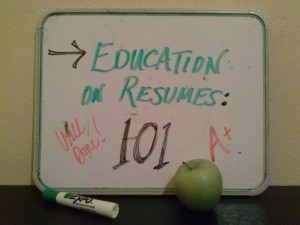Educate Yourself: How to List Education on Your Resume
By — — Posted in Resume Writing Tips
Here’s the Cliff Notes on Listing Education on Your Resume
(there’s also a YouTube Video at this link and shown below)
Job Search with Education, but No Experience & Behavioral Interviews
You’ll get an A+ if you follow these notes:
Overall:
- Don’t list your graduation/completion year if it was more than 5-10 years ago* (with some exceptions)Also, At that point, it starts to sound less relevant and possibly age you if it’s longer than 10-15 years ago. Same goes with the additional training you list — keep the ones you list on your resume to the most recent and relevant.
- I do like to see “Expected Graduation (or Completion) 2017” if you are currently enrolled in a program, though, so you are not implying a degree or qualification you have not yet earned)
- List the degree or qualification you earned FIRST – that’s the more important aspect, it suggests the skills you learned & is thus more applicable to the emplouer (not the school or education provider)
- Unless you are a recent grad without professional achievements & accomplishments (yet), there’s no real need to list your GPA, “Sum Cum Laude” grad & other academic accolades like scholarships won & student leadership activities or sports. These are okay to include up to 3-5 years after graduation, though professional opinions on this differ. Sometimes the amount of space you have available – or not – can help you decide when it’s a gray area.
- If space is an issue on your resume, accomplishments on the job always trump additional training, though always make room for your degree and any required certifications you have on your resume.
College:
If you did not finish a degree or other program, don’t just list the school (and don’t leave these classes off your resume, either!) I like to write, ” ## of (credit hours or courses) (XX type of) coursework Completed, School Name, year – year range* Like this:
EX: 30 credit hours of Nursing Coursework Completed, XYZ School of Nursing, City, ST, 2013-14
EX: 10 Business Marketing and Economics classes completed, Anytown University-Continuing Education Program, City, ST, 2015
Professional Development/Additional Certifications & Qualifications:
Remember to include on your resume professional development courses and other useful learning you’ve accumulated during your career, whether your company gave the training, sent you somewhere for the workshop, or you invested in some classes for yourself and your career skills.
Examples:
* Computer Software/Hardware, social media, anything technical
* Sales, Customer Service, Workplace Communication, Public Speaking & similiar trainings are applicable in most industries
* Industry specific and other applicable or required topics; could include additional official qualifications and certifications, for example: MOUS (Microsoft Users), PMP (Project Management Professional) or CEU approved courses in your field. Non-certification classes to expand your knowledge base that apply to your work all count, too!
I like the format to list additional education on your resume like this:
EX: Name of Training Course, Name of Provider Company, Location (city/state), Completion Year
Which looks like this:
EX: Team Building 101, ABC Training Corp., Inc., Anytown, FL, 2011
High School:
There is no need to include your high school diploma unless you are within 5 years of your high school graduation dates and have no additional education to list yet.
If you are recently graduated, follow the same guidelines listed above & make sure you include any extra curricular activities (sports, clubs, honor society memberships, etc.) here, too.
There’s no quiz for these guidelines (whew!) – the real test is if you present your Education & Training in a clean, clear, professional style on your resume, along with your work history, and get called for an interview!


